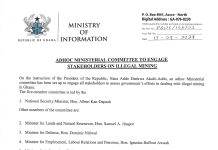Government’s vision of empowering the youth with digital skills to thrive in the new world of work is gradually taking shape as it has set afloat its Girls-in-ICT project.
Under the Girls-in-ICT project, 584 girls from Eight Districts in the Oti Region were trained on basic computer skills, coding and HTML in 2020.
The project in 2021 is projected to train 3,000 girls in three regions; Western North, North East and Savannah Regions.
Delivering update on the project when she took her turn at the Minister’s Press Briefing in Accra today, the Minister for Communication and Digitalization, Ursula Owusu-Ekuful said that Nine additional districts in Western North and Prestea Huni Valley had been selected to present 1000 girls to be trained in basic computer skills, fundamentals of programming, Scratch, and HTML.
She said the Ministry had completed the training of the first batch of 500 girls. The training of the second batch of 500 girls will commence tomorrow, Monday, 6th September to Saturday, 11th September 2021.
The Mentorship and Climax of the event will be held on Wednesday, 15th September 2021 at Sefwi Wiawso under the global theme: “Connected Girls, Creating Brighter Futures”.
The Minister explained that the purpose of the initiative was to encourage and empower girls and young women to consider studies and careers in the growing field of ICT while enabling both girls and technology companies to reap the benefits of greater female participation in the ICT sector.

SIM registration
In addition to the Girls-in-ICT project, the Minister said government through her Ministry will launch the National Subscriber Identity Module (SIM) Card Registration Exercise across the country next month.
The exercise which had failed in previous attempts would mandate network operators or service providers to activate a SIM only after the subscriber registers the SIM as directed by the National Communication Authority (NCA) under the Subscriber Identity Module Registration Regulations, 2011, L.I 2006.
Hon. Owusu-Ekuful explained that the SIM registration would help reduce fraudulent and criminal activities as well as help authorities ascertain the accurate number of valid and accurate SIMs on the networks. It would also enable operators to build better demographics of their customer base and help them develop products and services to suit the various groupings while enable the regulator, NCA, to also get more accurate data to regulate the industry.
She said that every subscriber would be required to provide their name and residential or occupational address, date of birth, in the case of an individual; and Certificate of Incorporation, in the case of a body corporate; or registration, in the case of a partnership or an unincorporated body of persons; and an identification document to facilitate the registration process.
Central Equipment Identity Register (CEIR)
Government would also set up a Central Equipment Identity Register (CEIR) to register handsets and equipment alongside the SIM registration.
The CEIR would connect Mobile Network Operators systems in a non-intrusive manner in order to aggregate all International Mobile Equipment Identities (IMEIs) coming from all the local operators in a single national IMEI database.
Mobile device manufacturers estimated that about five million mobile devices are imported into the country annually, but the necessary customs duties and taxes are paid on only 60 % of these imports.
Data from the Ghana Revenue Authority (GRA) confirmed that 40 per cent of these mobile devices enter the Ghanaian market illegally, without government benefiting from the expected tax revenue.
This, the Minister said would help address the challenge of the smuggling and trade in counterfeit, stolen and substandard mobile devices and increase the potential for enhanced revenues for government.
Source: MOI (PR Unit)

























